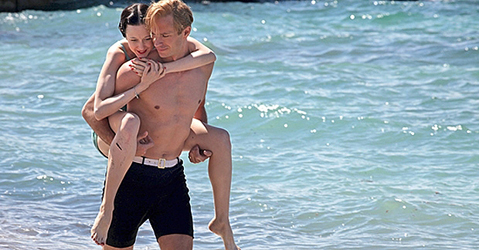W.E.
Abbie Cornish, James D’Arcy, and Andrea Riseborough star in a film written by Madonna and Alek Keshishian and directed by Madonna.

Like Charles Foster (Citizen) Kane and the newspaper business, Madonna thought it would be fun to make a movie. She’s had her brushes with the movie realm before, bad (remember Shanghai Surprise?) and less bad, but this time out, the one-name wonder wanted to go deeper, to add the mythic “writer/director” role to her tangled cultural-hyphenate personality as singer-dancer-pop-icon-voguer-winking-iconoclast. Taking in the often shallow and dizzily glib nature of this directorial effort, we get the impression that she ought not to give up her other day job(s).
On the other hand, W.E. is so bad and bungled on so many levels, from the uneven acting to the bizarre stylistic mash-ups and shameless ogling of lives of the rich and famous, it’s perversely fun to watch. Even the lame and mawkish music seems perfectly suited to a film so unapologetically meager of artistic means. All told, this thing could make its way into the lofty/turgid ranks of cinematic Golden Turkeys.
All is not for naught, though. Madonna begins with an intriguing premise, which sheds particular light on feminist issues in the power playground of male-female relations, going back to the tragic-romantic true story of King Edward (James D’Arcy), who literally gave up his throne for the love of an American woman, Wallis Simpson (Andrea Riseborough). Crosscutting stories between decades and six-degree distances, we drop in on episodes from the Royal family scandal as it unfolds, alongside the tale of a wealthy young woman, handily named Wally Winthrop (Abbie Cornish) from the 1990s, who’s living with a cool and abusive husband in N.Y.C. Our restless and romantic Wally becomes obsessed with the Duke and Duchess story via personal artifacts being sold at Sotheby’s. No plot-spoiler alert is necessary in reporting that she takes a shining to a gallery security guard, a violation of strict class similar to the king’s obsession with an American beneath his station.
Occasionally, W.E.’s two heroines bump into each other, through the magic of Madonna’s fairy-dusting narrative. By the time they meet on a Central Park bench, our head hurts from two hours of eye rolling, though, alleviated only by periodic snickers of disbelief. Adding insult to the injury of misguided art making and mediocrity-while-we-wait, Madonna the singer steps up to the plate with the song “Masterpiece,” sounding utterly generic in her calculatedly bland poppish way. She sure dances well, though.



